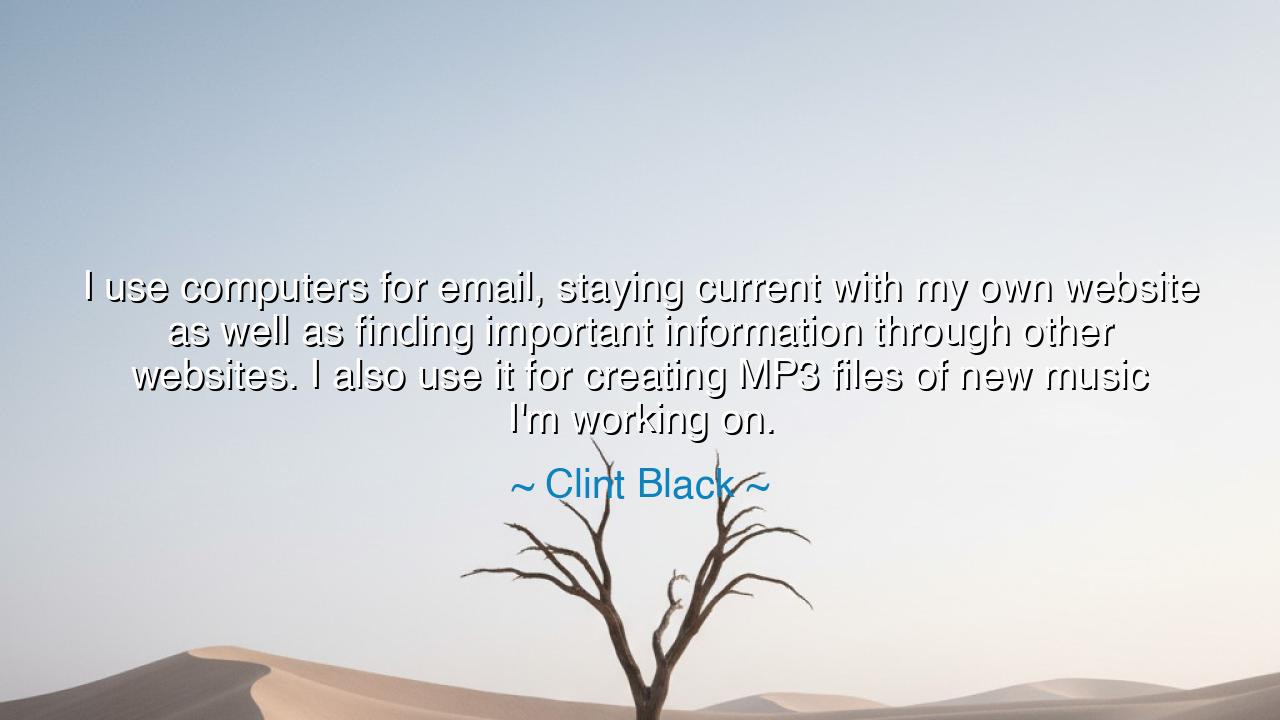
I use computers for email, staying current with my own website as
I use computers for email, staying current with my own website as well as finding important information through other websites. I also use it for creating MP3 files of new music I'm working on.






In the unfolding of human history, there are pivotal moments when the tools we create evolve from mere instruments of labor to powerful agents of expression and connection. The words of Clint Black—"I use computers for email, staying current with my own website as well as finding important information through other websites. I also use it for creating MP3 files of new music I'm working on"—speak to this profound shift. What Black reveals is not just the function of computers in his life, but their role as extensions of the self, capable of fostering connection, creativity, and access to vast new realms of knowledge.
To understand the deep truth embedded in Black’s words, we must first look back to the ancient world, where tools and technology were central to the advancement of civilization. The Greeks, for instance, were pioneers in many fields of knowledge. Archimedes, the brilliant mathematician, devised simple yet profound machines that expanded the human ability to understand the world. Archimedes' screw, which allowed water to be lifted for irrigation, is just one example of how technology was intertwined with creativity and progress. Though the Greeks lacked the complex computers of today, they used the tools of their time to bridge the gap between thought and action, just as Clint Black uses his computer to translate the sounds of his inner world into digital form.
Consider the way Leonardo da Vinci, in the Renaissance, used his sketches and inventions to fuse art and engineering. Da Vinci's works, many of which were ahead of his time, blended creativity with practical problem-solving, laying the groundwork for future innovations. He used the available tools of his time—pen, ink, and parchment—but his mind saw possibilities that transcended those limitations. Clint Black’s use of modern tools, such as computers and MP3 technology, is in the same vein. Black creates, connects, and organizes with a tool that allows him to both preserve and share his artistic vision with the world, much as da Vinci did in his era.
The power of the internet and the digital age that Black embraces lies in its ability to connect individuals across vast distances. The Greeks had their Agora, the Romans their forums, and the Renaissance thinkers had salons and academies. Each was a place where ideas were exchanged, and connections were made. Today, the internet is our Agora, allowing individuals to collaborate and share information instantaneously. Black’s use of email and websites illustrates how the digital world has become a place of knowledge, a repository where we can find information, gain wisdom, and connect with others in ways unimaginable to past generations.
But beyond simply being a tool for communication, computers today serve as instruments of creativity. Like da Vinci’s sketches or Beethoven's compositions, the computer allows Black to manifest his ideas into sound, shaping them in the form of MP3s—a medium that allows him to share his music with the world. The ability to take a raw idea, whether it be a melody or a thought, and refine it with the help of technology is a gift that past generations of artists could not have fathomed. It is a reminder that technology is not just for function; it is a means for expression, allowing humanity to communicate, create, and preserve in ways that were once the province of only a few.
Yet, while Black’s words show us the immense possibilities of the modern age, they also carry a lesson of balance. The ancients, despite their magnificent innovations, were keenly aware that tools should never overpower the human spirit. In the story of Archimedes, for instance, it is said that his last words, uttered as he was killed during the Roman invasion of Syracuse, were a plea for his mathematical studies to remain undisturbed. For all their brilliance, the ancients understood that the mind must always govern the tools, and never the other way around. In the modern era, where technology plays an ever-growing role, it is essential for us to remember that it is the human spirit, not the machine, that should drive progress.
The lesson from Clint Black’s words is one of empowerment and responsibility. We live in an age where the tools of creation, communication, and connection are in our hands, but it is up to us to use them wisely. As Renaissance men like Leonardo da Vinci did, we must create with a sense of purpose, share our knowledge with others, and always keep the human spirit at the center of our work. Technology can enhance our lives and broaden our capabilities, but only when we retain control over it, ensuring that it serves our humanity and not the other way around. Let us move forward with both vision and humility, embracing the tools we have while remembering that the true power lies within us.






AAdministratorAdministrator
Welcome, honored guests. Please leave a comment, we will respond soon